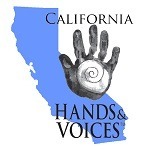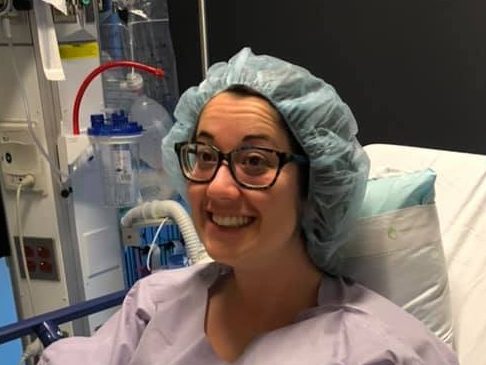I self-identify as….
Hard of hearing, deaf (not Deaf), disabled.
What do you enjoy doing in your free time?
Reading and writing, music (listening and playing), board games.
Please tell us about your earliest years of life related to your hearing, identification etc.
I was tested very young, and doctors initially failed to recognize that I was deaf. They told my parents I was “slow.” Eventually, my nana noticed that I specifically didn’t respond when I was facing away from a person, and so my parents had me tested again when I was 2. They were told that I was moderate-severely deaf (sensorineural), and I got my first set of hearing aids. It is most likely from Enlarged Vestibular Aqueducts (EVA). I got my cochlear implant at 8. My parents spoke with many people, and fortunately, they were good friends with a teacher of the deaf. After they chose to raise me orally, I attended CCHAT preschool for spoken language for deaf children.
Please share with us about your immediate family relationships and inclusion tips for extended family members.
I know the attention I required for services (speech therapy, audiology, etc) was often difficult for my siblings, but they have always been supportive and loving. I never felt unwelcome or any kind of animosity from them. It definitely helped that we attended D/hh family camp (now CA Hands & Voices) growing up, and my family got to know other families, hearing siblings, and hear more about the experience of being deaf. We grew up seeing extended family fairly regularly, so I never found there to be any awkwardness or lack of communication. I do recognize that this may have a lot to do with my being raised with the same language and culture as my extended family.
Please share a little about your education placement & extracurricular activities as a youth.
Except for CCHAT (preschool for spoken language for D/hh children), I was mainstreamed in public school for all of k-12. I was always the only deaf person in my classes. I used the FM system, video captioning, and always sat in the front. I was in speech therapy/other services for most of k-12, as well. I received CART in my final semester of senior year, but only because of an injunction from the courts. In college and in grad school, I received CART, FM systems, and a private/quiet place for exams with no struggle. Extracurricular groups were generally very welcoming (student organizations, some sports, and music). I only faced negative response from marching band directors.
Please tell us about your relationships with DHH peers as a youth and how they impacted your life.
I am very open about being deaf, so many people know it before we become friends. I don’t always introduce myself with it, straight off the bat, but if I mis- hear something, I’ll ask them to repeat it and explain that I’m HoH. I often had a small group of friends with a few really good friends. All of my school friends were hearing, but I also had a close group of HoH friends from CCHAT and D/hh family camp. I love both groups of friends. However, having D/hh friends has often been a respite for me and was a huge part of my developing self-identity and confidence.
Please share how you/your parents prepared for a new school year and any Tips for Teachers that worked for you.
When I was growing up, my parents prepared a folder of information (including the IEP, list of tips for communication, etc.) for each of my teachers. I often met them beforehand or just before class to explain the FM/other accommodations. In elementary school, my mom also gave a presentation to my classes. I was often really embarrassed, but I do have some appreciation for that for not ever feeling like I needed to hide it. In grad school and in my doctorate (now), I meet with disability services and email each of my professors to introduce myself, explain my accommodations, and explain how to communicate with me.
Did you attend your IEP meetings? What memories do you have of your IEP, goals and services?
In elementary school I often joined very briefly, but I didn’t start participating until middle school. I was more involved in middle school but certainly in high school. IEP meetings were often very frustrating. My family began requesting CART in middle school, and the “team” kept suggesting other accommodations (meaning-for meaning vs word-for-word) before refusing transcription altogether. We were in a lawsuit with the district for several years until (and after) a court injunction required them to provide CART for my last semester of high school. The assistant principal once told my mom that I “only needed c’s to graduate,” which was incredible demeaning and refusing when I was trying to do my best and attend a 4-year college. I had many teachers who were very helpful and some service providers who were not. I really appreciate that my parents always encouraged me to advocate for myself, and I do wish I had been more involved at an earlier point.
What type of technology, apps or products for Deaf and Hard of Hearing individuals do you use?
Closed captions, always, including in movie theaters. I also always use my hearing aid and cochlear implant, even when alone. I use FMs (Roger Select) and texting. I use my phone’s vibration as an alarm clock in the mornings but have used bed shaker clocks. I use flashing fire alarms, as well as a visual doorbell. I’d like to get a service dog, at some point.
Can you tell us a little about your college experience and how did you prepare for college? Any tips?
When I visited colleges, I always met with (or reached out to) disability services to see what they’re willing to provide and what they’ve provided to students in the past. I was SO relieved at how accommodating most of them were. In college and grad school, I used CART and microphone systems, and my dorm rooms had flashing fire alarms/bedshaker clocks. When my CI had internal failure and I had to have surgery in my first semester of grad school, my department and disability services were immensely helpful in helping me finish classes remotely. College definitely challenges you to self-advocate and find resources, as well as find the social circles that are best for you.
Please share a little about your career and any tips for someone considering a similar career?
I’m currently working on my PhD in English. I’ve always loved literature, and I specialize in early modern lit (think Shakespeare) and disability studies. I like the research, the reading, and that I get to teach and work with college students. Grad school means I get to still be a student, but TAing and teaching definitely provides new challenges to adapt to, and I’m currently navigating accommodations for those roles (as an employee, rather than student). I’m hoping to get CART for the class I’m working with (remotely). Academia is definitely a unique field at the moment, and the humanities area is very competitive for stable jobs. That said, if you like learning and research, you get to learn more about the things you’re interested in and still get to work with people. For any career as a deaf person, find what you love and enjoy doing, what you’re good at, and keep advocating for yourself.
Please tell us about your relationships with DHH peers as an adult. When meeting a new person what script have you found helpful when telling them that you are DHH?
I’ve maintained friendships with D/hh friends I grew up with––ones I met in preschool, camp, LOFT (AG Bell), etc. I’m very open about my deafness, depending on the circumstances. It most often comes up when I need to ask them to repeat something. I generally say “I’m hard of hearing, can you repeat that?” or ask if they’ll face me.
What were some of strategies that your parents, teachers or DHH role models taught you that helped you to be a confident independent person?
My parents encouraged me to self-advocate from a young age. I participated in IEPs, asked for captions on TV when they weren’t already, etc. It definitely takes practice to become comfortable asserting yourself. It helps to know what accommodations work best for you, your legal rights, etc. It’s always okay to ask for something you need, to see if it’s available. Ask to sit in a quieter part of restaurants, ask for a script when seeing a play, etc. Most people are well-intentioned and helpful.
Most DHH children are born to hearing parents. This question may help parents see the world through their child’s eyes. Please tell us about your day to day life experiences as a DHH adult.
Deafness/disability (for those who identify as such) is hard to completely understand without experiencing it. It means carrying the knowledge that the world isn’t built for you. It means relationships with other D/hh people are invaluable because you don’t have to explain these things. It means everything (especially verbal communication) takes much more energy. It means taking the time to figure how you identify when there’s many ways of being ‘deaf.’ It means expecting others to make assumptions about you.
It also means invaluable relationships with others who ‘get’ you and your experiences. It means access to empathy to other experiences. It comes with an insular community and culture, if you want it. It means flexibility and adaptability, acquired skills unique to deafness.
Being deaf is often difficult in a world not built for me, but I wouldn’t change it for anything.
What accomplishments are you most proud of in your life?
My academic career (finishing my MA and thesis, getting into a PhD program), music performance, and learning how to be an independent adult (which is difficult enough without disabilities!)
What tips and strategies do you have for communicating with a DHH person?
I ask people to face me, slow down, repeat themselves, find alternate seating when possible (ie., in a restaurant), and above all– to have patience.
Favorite quote? Final comments?
There will always be people who love you for who you are, including and not in spite of your deafness. Keep speaking up for what you need. Meet others who are deaf and/or disabled. Community!
“People may be surprised to know that I…..”
am a musician and am trilingual.

